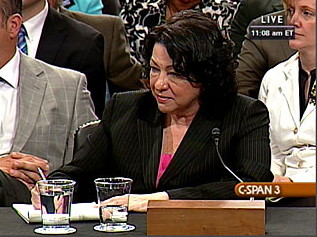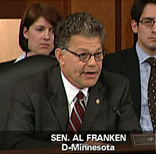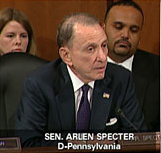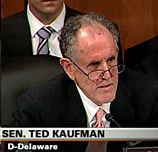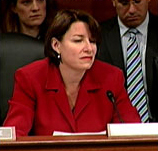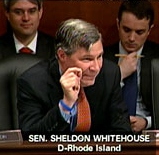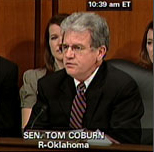Day 3, Confirmation Hearings: 2nd Amend. Fundamental? 'Have Not Made Up My Mind'
Editor’s note: Click here for more Sotomayor hearings coverage.
5:50 p.m. ET—Done for the day. Sen. Benjamin Cardin (D-Md.) also runs down a series of Sotomayor opinions having to do with allowing people to own homes, and the freedom of religion. Again, Sotomayor goes over several issues regarding the First Amendment and the ownership of homes. At this stage, many of her answers appear to be efforts to explain the cases, but limiting herself on how much policy she is allowed to tell the committee.
Leahy calls a recess until tomorrow at 9:30 a.m. ET.
5:17 p.m.—Prior rulings. In rapid fire, Sen. Chuck Grassley (D-Iowa) leads Sotomayor on a discussion of precedents, and goes back through several quotes of Sotomayor’s. Again the list includes her regarding of previous cases, and answers to questions about her use of former cases, and how she regards her way of making decisions.
As an observer, it’s hard to gauge how many times Sotomayor can reanswer the same questions. It appears that the rapid questions may serve the use of trying to trip her up.
Grassley goes back to Didden, the case about public takings. He restates dates of the opportunity for filing his suit and wonders how the judge could have ruled on the basis of statute of limitations. Again, Sotomayor restates the basis of the case.
5:09 p.m. Back in session.
4:52 p.m. 15-minute recess.
4:30 p.m.—Can judges read new rights into the Constitution? Sen. Orrin Hatch (R-Utah) brings back the Second Amendment case, Maloney, and says that Scalia’s opinion gives more room to make a broader fundamental conclusion.
Can judges read new rights into the Constitution? he asks. “The constitution creates the rights. It’s immutable,” she says. She goes into a discussion about the rise of various rights from parts of the Constitution. Those newer rights merely come from those already stated in the Constitution, she adds.
“Do you believe the Supreme Court bends the Constitution when it reads rights that aren’t in there?” Hatch asks.
She insists the court can only use the words in the Constitution to describe newer rights.
Hatch and Sotomayor talk about rights and the Constitution. He criticizes a lecture from 2006 that the court of appeals does justice to society. So what does a Supreme Court justice do justice for?
“They are all in the context of describing for young lawyers information about precedents,” she says. “You are looking at the effect of those cases on other cases.”
Hatch then talks about Justice Clarence Thomas, and how George H.W. Bush described how he decided cases. Both Bush and Obama have talked about empathy, she says, but she can only describe it as judges may bring in their emotions, but can’t decide upon them.
From the Web:
In 1998, when she was confirmed as a federal judge, Sotomayor said a court shouldn’t bend the Constitution, Hatch recalled, then asked her to describe how a court could bend the Constitution, recounts the Top of the Ticket blog of the Los Angeles Times.
“I said you can’t. The words are the words,” replied Sotomayor. “The court can’t be looking to ignore the words or to change them. What it does is apply those words to each situation. I stand by that answer today as I did then.”
4:15 p.m.—Granting cert. Kohl poses another question on stare decisis. “Can’t the court overrule itself?”
Sotomayor goes on to a lecture about precedents. She points to Brown, and says there were indeed some changes in case law before Brown, which made it less of a huge change than many said it was.
Kohl moves back to antitrust. He points to the Twombly case and the need to raise the pleading stage. Does this do damage to antitrust law?
She declines to respond, saying that Congress could change the law. Kohl says Twombly will have a negative effect of individuals’ rights to bring cases. “I think that’s a precedent that needs to be considered accurately,” he says.
He then asks about granting cert. Limiting the number of cases is a power that justices have. “How will you determine which cases are so important to grand cert?”
She says the court must consider whether the case will have an impact, how it affects the workload, etc. “You don’t look at policy; you look at how the case will be reviewed.”
3:50 p.m.—“I have not made up my mind.” Sen. Sessions takes the podium. He says he’s still concerned about some of the issues that have been raised.
Referring to the “wise Latina” quote, Sessions says O’Connor insisted that judges should reach the same conclusion, whereas Sotomayor seems to imply that different beginnings involve different outcomes.
He cites an offering by Sen. Hatch that activism involves bringing personal viewpoints into an opinion. Again, Sessions asks Sotomayor once more to explain the quote. She again refers back the O’Connor quote and says her intent was not what Sessions explains.
They also disagree on the Second Amendment case again: Sessions saying gun rights ought to be fundamental; Sotomayor saying the court hasn’t made that ruling yet. He asks if she should recuse herself if the issue comes up to the court.
“I have not made up my mind over the issue of whether the Second Amendment should be fundamental,” she responds. She says the 7th Circuit that came to the same conclusion as the 2nd Circuit.
Hitting his points quickly, Sessions also insists that Sotomayor’s statements indicate that foreign law may be a part of the case. Then he points out her involvement with the Puerto Rican LDF, and questions her involvement with the fund’s litigation stances.
From the Web:
In the second round of questioning, Sessions just won’t let the “wise Latina” issue go, reports the Caucus Blog of the New York Times. Sotomayor apologizes again for speaking unclearly on the subject: “My rhetorical device failed. … It left an impression that has offended people and has left an impression that I didn’t intend.”
3:40 p.m.—“I believe that we do need real-life experiences.” The sound is restored. Leahy reads out several cases endorsing Sotomayor. In response, Sessions offers letters from the Club for Growth and several other groups opposing Sotomayor’s confirmation.
Leahy begins his next round of questioning. He touches on the Redding case involving strip searches of a high school student.
Only Justice Ginsburg understood the search of a girl to be humiliating. He also touches on the Ledbetter ruling, and a few others.
“I believe that we do need real life experiences,” he says. How might it affect young people to see only one person on the Supreme Court?
She says that even Ginsburg, who is friendly with lots of people on the court, says she misses O’Connor on the court.
Leahy hits on the right to counsel in Gideon v. Wainwright and asks about the right to counsel. Sotomayor says there should also be capable counsel.
3:30 p.m. There was a temporary halt because the sound system went out.
From the Web:
The Associated Press provides a blow-by-blow account of the microphone problem.
3:11 p.m. Leahy will recall the committee when they are out of private session.
From the Web:
One milestone in Sotomayor’s confirmation hearings is created by a senator’s absence, reports the Capitol Briefing blog of the Washington Post. For the first time in nearly 50 years, Sen. Ted Kennedy (D-Mass.) is not among the committee members.
Although his health might have precluded his participation anyway, Kennedy stepped down from the committee earlier this year after nearly 47 years of service as a member and former chair, after new rules limited the number of committees on which senior senators may participate. Meanwhile, another longtime senior member of the committee, Joseph Biden, also is no longer serving, due to his election to the White House as vice president to Barack Obama. “Their absence was barely acknowledged yesterday amid a litany of opening statements that seemed to lack a sense of historical heft,” the blog reports.
2:50 p.m.—“You’re not going to tell us?” He and Sotomayor go back and forth on voting rights and the 15th Amendment. Sotomayor declines to respond.
“So, that means, uh, you’re not going to tell us?” says Franken. The audience laughs. You get the feeling that it should be Amy Poehler out there to go one on one with him.
Franken slips into a monotone to ask a legal question. It appears someone else wrote out the legal questions for him because he lacks the guidance that other senators have when weaving in their specific legal questions with an off-handed ability to gain an answer. When Franken isn’t so guided, his voice offers that sardonic, self-effacing tone familiar from Saturday Night Live.
He ends: “What was the one case in Perry Mason” that he lost?
“Gee,” she says. “I don’t remember.”
“And you don’t remember that case?” he asks. “Didn’t the White House prepare you for that?”
From the Web:
The case that Perry Mason lost? “The Case of the Deadly Verdict,” the White House reportedly told the Los Angeles Times’ Top of the Ticket blog. It aired on Oct. 17, 1963. The Washington Sketch blog of the Washington Post gives a detailed account of Sotomayor’s lost opportunity to score with Perry Mason trivia.
2:35 p.m.—“I think that’s pretty cool.” Minnesota Democrat Al Franken opens up talking again about Perry Mason. “We knew when it was 10 minutes to the end that someone would confess,” he said. “I’m amazed,” he said, “that you want to be a prosecutor, because the prosecutor lost every week. And now you’re nominated to the Supreme Court,” he said. “I think that’s pretty cool.”
Franken refers to the court’s 2005 Brand X opinion, where the court allowed cable companies to share their infrastructure with Internet service providers such as Brand X and EarthLink.
He asks about the future of Internet publications. Sotomayor says there is a lot of work to do on who owns the Internet.
He switches to judicial activism. A lot of people use this word to describe the other side. He asks Sotomayor to describe it.
“I don’t use that word,” she says. In her sense, it means a judge is acting on policy, but she says she doesn’t do that, so she doesn’t use that word.
From the Web:
The so-called “Brand X” case is National Cable & Telecommunications Assn. v. Brand X Internet Services, 545 U.S. 967 (2005), reversed and remanded. In it, the U.S. Supreme Court held that cable operators which offer high-speed Internet access to customers had no duty to provide such services to all Internet users, as a SCOTUSblog post explained shortly after the decision was rendered.
A copy of Franken’s opening statement is provided by the Senate Judiciary Committee website.
Franken previously asked questions of a Supreme Court nominee in a fictional context in 1991 when he played the role of Sen. Paul Simon in a Saturday Night Live television skit about the confirmation hearings for Clarence Thomas. The Boston Globe’s Political Intelligence blog has the video. In the skit, the nerdy “senator” sought advice from the justice-to-be about picking up women, after allegations that the nominee had sexually harassed attorney Anita Hill. Thomas has denied those allegations.
2:20 p.m.—Cameras in the courts. Specter gets increasingly irritated when Sotomayor passes on answering specific questions that he reminds Sotomayor that he sent her information to respond to. But, he asks, can a senator expect an answer to any question that he asks at confirmation hearings?
Sotomayor says that’s where the line between the two bodies—court and Congress—is drawn. She assures Specter that he can rely on her 17 years of experience on how she would operate.
He switches to TV. He says the court is the least responsible body since there is no television permitted there. He says he asked Chief Justice William H. Rehnquist if TV could be permitted during Bush v. Gore. Rehnquist turned him down, Specter says.
“Shouldn’t the American people have access to the court?” he asks Sotomayor. “Why not televise the court?”
Sotomayor says if confirmed, she will rely on her own experience as a judge operating in a televised courtroom if the court should decide whether to televise.
From the Web:
More so than any of the Republicans so far, Specter was visibly and audibly upset at the way Sotomayor skirted some of his questions, reports Newsday’s Spin Cycle blog. A former chairman of the committee and its ranking Republican member until he switched allegiance to the Democratic party several months ago, Specter now serves as the next-to-last interrogator in the confirmation process.
Republicans on the committee have complained about Sotomayor’s reticence, too, the Wall Street Journal Law Blog notes. However, she has nonetheless “continued to demonstrate a command of the law and an impressive memory for details,” the newspaper writes.
Democratic members are ahead of their Republican counterparts in asking substantive questions about Sotomayor’s views on abortion, reports CQ Politics.
2 p.m.—“Wise Latina” flap overblown. the podium goes to Sen. Arlen Specter, who is now a Democrat, but was chair of the committee when he was a Republican until this year.
Regarding the “wise Latina woman” statement, Specter says some on the committee have made a mountain out of a molehill. “The expectation is that a woman would want to say something to prove her competency,” says Specter. Previous nominees, such as Thomas and Alito, have all talked about their backgrounds.
Specter switches to looking at the decreasing number of cases that the court decides. Can the court decide more cases? “Well, I’m not very good at talking about that until I’m on the court,” she says.
Specter next wants to know whether the court would take a case that involves the executive branch hiding intelligence information from Congress. How can she not take that case?
Sotomayor moves around it. But Specter gets frustrated; he says he sent her an article to prepare for it. Then he moves on.
He next wants to know about the history of stare decisis. Specter points to Roe and wants to know what the situation is regarding that case as precedent. Wouldn’t 38 cases that the court received add a little support to where the court had the effect of overruling Roe but didn’t do it?
Sotomayor edges around the answers, and Specter ends the discussion and then moves on.
From the Web:
Specter interrupted Sotomayor several times, but said concerns expressed by others concerning her oft-criticized “wise Latina” comment had made a mountain out of a molehill, reports CQ Politics.
12:57 p.m. Lunch break. Sen. Allen Specter (D-Pa.) will have the floor at 2 p.m. ET, followed by Sen. Al Franken (D-Minn.)
From the Web:
Sotomayor has Justice Clarence Thomas to thank for the upcoming closed-session review of her background check, once two more Democratic senators complete their questioning of the nominee after a lunch break, notes CQ Politics. The private review was crafted by then-committee Chairman Joseph Biden Jr. (D-Del.), after last-minute allegations that he had sexually harassed Anita Hill nearly derailed Thomas’ nomination to the high court.
Also, ABAJournal.com wants to know: What questions would you be asking Sotomayor right now?
12:40 p.m.—Securities law. Kaufman walks off into a thicket about securities laws. He asks Sotomayor about securities law in the 2nd Circuit. She says the 2nd Circuit is where much of commercial and securities law appeals are heard.
12:25 p.m.—Sotomayor the litigator. Sen. Ted Kaufman (D-Del.) asks Sotomayor about her work as a litigator at a law firm.
Sotomayor describes the work she would do dealing with commercial law and contracts. She explains that much writing looked like “gibbledygook,” but she began to understand how the wording was important.
Kaufman asks how her experience as a district judge affected her work as an appellate judge. “It made me more secure in assessing the facts,” she says. She adds that she was often the only judge who asked appellate attorneys whether they asked these facts at the lower court. Often, she says, they didn’t.
From the Web:
Sotomayor declined to say expressly, in response to a question from Kaufman, whether Congress has the power to regulate the financial markets as national leaders struggle to cope with an economic downturn unprecedented in the lives of many Americans, according to Reuters.
“What I can say to you is that Congress has certain constitutional powers,” she responded. “One of them is to pass laws affecting interstate commerce.”
12:15 p.m.—“The facts render the decision.” Klobuchar asks about the Melendez-Diaz case from the Supreme Court where the court requires technicians to report to court as witnesses. Klobuchar says she agrees with the defense in that case.
Sotomayor understands the issue for prosecutors, but says that can’t predict a result.
Klobuchar moves on to critics of Sotomayor in saying she too often refers to the facts. To her, the senator says, this indicates thoroughness.
Says Sotomayor: “The facts render the decision. We’re not fact-finders, but we have to know the facts to decide what law we’re going to apply them to.”
Sotomayor is asked about the Booker change in sentencing guidelines. She says there is some play in the district courts, but not very much.
11:55 a.m.—Perry Mason. Sen. Amy Klobuchar (D-Minn.) another former prosecutor, asks about a Sotomayor quote about how capable a prosecutor is to change society. Sotomayor says there is little ability to help change a defendant at that point. She adds that she believes opportunities to change a person begin at youth and education.
“We cannot remedy society in a courtroom. We can only apply the laws before us,” says Sotomayor.
Sotomayor refers to an old episode of Perry Mason, where a prosecutor says he’s not upset that he lost a case. My job, the actor said, is to make sure justice is done. Sotomayor says she was stunned by that, that the law was about justice.
Sotomayor launches into a series of cases she handled at a prosecutor. She speaks easily and with great pride about them. It’s easy to see she is at great ease in talking about how she handled defendants and witnesses.
“That’s such a wonderful part of being a prosecutor.” she says. All participants in this process think that way, she adds. It’s also obvious that Klobuchar also remembers her experiences as a prosecutor. The discussion between the two is like a pair of veterans remembering their days as young assistant district attorneys.
From the Web:
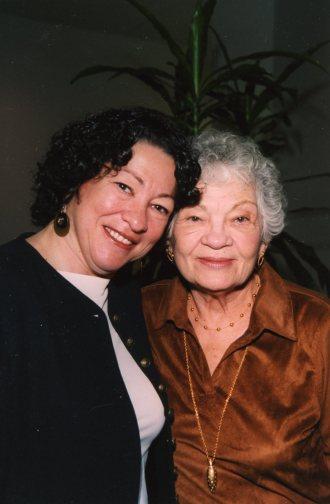
Whitehouse.gov
In an interview on Minnesota Public Radio previewing her planned questioning of Sotomayor, the senator said she planned to focus on the nominee’s early work as a prosecutor and her criminal justice opinions.
But in opening comments, Klobuchar initially focused on how impressed she’s been, so far, not only with Sotomayor but with her mother, who is watching the hearings from a front-row seat, reports the Top of the Ticket blog of the Los Angeles Times.
11:36 a.m. 15-minute break.
From the Web:
Sen. Orrin Hatch (R-Utah) didn’t confine himself to the confirmation hearings in voicing his concerns about Sotomayor, reports the Hill’s Twitter Room. In a tweet on the Twitter social networking website today, he described her testimony as “quite generic on occasion,” a “sure sign of WH coaching.”
11:25 a.m.—Fourth Amendment. He praises Sotomayor’s involvement with Manhattan District Attorney Robert Morgenthau’s office. Whitehouse, also a prosecutor after law school, says they compared who had the worse office starting out, and says it was Sotomayor.
The two go on to a long conversation about the right of privacy and what a court may do to enter a personal home and search for evidence. Sotomayor gives a long discussion of the legal background of the Fourth Amendment.
11:20 a.m.—Youngstown revisited. Whitehouse wants to know the limits and powers of each branch of government. Sotomayor refers back to the Justice Robert H. Jackson’s concurrence in the famous 1952 case of Youngstown Sheet & Tube Co. v. Sawyer, where he sets up the powers and limits of Congress and the president.
11:05 a.m. Role of juries. Rhode Island’s Democratic Sen. Sheldon Whitehouse asks about the role of the jury. He wants to know her take on the state of the jury and how it fits to the founders’ ideals.
“Virtually every juror I have ever worked with came away heartened by their role as a juror in the process,” she says. Sotomayor says she knows the system both as a prosecutor and a district judge. She says she is very appreciative of jurors’ involvement in the system.
11 a.m.—Foreign law. Coburn wants her ideas on using foreign laws to decide American cases. She says she has agreed with Justices Antonin Scalia and Clarence Thomas that one has to be limited in using foreign laws. She says she has never used foreign law to make a decision.
“Is it important that we look good to people outside this country?” he asks.
“We don’t render decisions to please the home crowd—or any crowd,” she responds.
10:50 a.m.—Self-defense. Coburn wants her to tell him how some rights are fundamental and others have to be incorporated. Sotomayor says it’s the court’s function to make that decision.
Coburn wants her personal opinion on the right of a person to self-defense. She demurs. “But that’s what the American people want to know, your honor,” he says. “They want to know what you think.”
In trying to answer the question, Sotomayor switches to New York law, which she knows. If a person is endangered, then they are allowed to use personal defense. She expands on the limits of getting a gun and defending against a crime.
10:35 a.m.—Abortion law, Second Amendment. Oklahoma Sen. Tom Coburn, the last Republican on the panel today, starts out asking about the state of abortion law today. Sotomayor refers to the cases—for example, Casey—as a response.
Coburn wants to know if new technology that indicates the status of an embryo would be considered. Sotomayor says she can only respond as to what the court has required.
“We don’t make policy statements in the court,” she says. Coburn says that one of her past statements is that you do make policy, but he leaves it at that.
Now he changes to the state of death. May states decide that? Sotomayor passes on that, saying it depends on the cases that the court considers.
Coburn asks about the case of Maloney having to do with New York’s rights to bear arms. Sotomayor gives a long description on incorporation of fundamental laws to the states.
Coburn wants to know if he can bear arms in Oklahoma. Again, Sotomayor refers back to the understanding of incorporation.
From the Web:
Coburn, a physician, tried to pin Sotomayor down on her views on abortion and when life begins, but she said this is an issue for the states to address rather than one that “the court reaches out to answer,” reports the Caucus blog of the New York Times.
Similarly, when Coburn tries to ask her about the legality of aborting a 38-week-old fetus that has been diagnosed with spina bifida, Sotomayor defers to state law, reports the Campaign Spot blog of the National Review. “I can’t answer that question in the abstract, because I don’t know what the relevant state law is on the issue,” she tells Coburn.
Although Sotomayor says she was never asked about abortion by President Barack Obama before he nominated her for the supreme court, the issue was a focus of today’s Senate confirmation hearing, reports the New York Times.
“Where are we today? What is the settled law in America about abortion?” Coburn asked her at one point. In response, Sotomayor cited the landmark 1973 U.S. Supreme Court ruling in Roe v. Wade and a recent reaffirmation of its core holding, Planned Parenthood v. Casey, 505 U.S. 833 (1992). However, as the Oyez blog notes in a brief synopsis of the case, the majority not only permitted Pennsylvania to impose consent requirements but adopted a new “undue burden” test for determining the validity of state regulations concerning abortion.
10:20 a.m.—Pro bono work. Cardin switches to women’s rights, and praises Sotomayor for her work at Princeton University as an undergraduate, one of the first classes that allowed women to matriculate.
Sotomayor explains the University of Michigan cases from a few years ago on the Supreme Court, and praises the law school decision that allowed some consideration of an applicant’s race toward admission.
Cardin says he wants a justice who fights for the civil rights of many people—African-Americans, the disabled, gays—who may have been wronged by society.
Cardin also asks about the right to privacy and lists the many cases that explain it. Sotomayor’s answer is that those cases will decide future issues that come before it.
Finally, Cardin talks about pro bono difficulties and emphasizes that Congress should do more in this territory. “If you look at the body of my speeches,” she says, “pro bono work is the major body of work I speak about.” She emphasizes to her leaders that they should be focused on public participation. She also mentions that the ABA wants lawyers to be involved. “That’s a core responsibility of lawyering.”
10:10 a.m. ET—NAMUDNO v. Holder. Cardin switches to civil rights and points to the NAMUDNO v. Holder case this past fall. In it the court challenged Congress to come up with another statute regarding voting and civil rights. As with other Democrats, Cardin is shearing the discussion toward issues and legislation that Congress will likely take up.
Sotomayor returns to a similar case she decided several years ago, Hayden v. Pataki, in which she said that she was limited to her ruling because it was based on a congressional law. Cardin compliments her decision.
From the Web:
In Hayden v. Pataki, 449 F.3d 305 (2d Cir. 2006), Sotomayor joined the main dissent from the en banc decision and also wrote a separate dissent, explains a SCOTUSblog post on Sotomayor’s rulings from the 2nd U.S. Circuit Court of Appeals bench. The plain language of the federal Voting Rights Act, she said, conflicted with a state statute denying convicted felons the right to vote and should have been followed.
10 a.m.—Judicial temperament. Sen. Benjamin Cardin (D-Md.) returns to the issue raised yesterday about Sotomayor’s judicial temperament. Others quoted in the article cited yesterday by Sen. Graham praise Sotomayor over her skills rather than criticize her.
She responds that her style is to engage, and that’s how she finds the appropriate answers to her questions.
9:58 a.m.—Revisiting Ricci. Cornyn then returns to Ricci, and asks why Judge José Cabranes opined that there should have been a longer 2nd Circuit ruling.
She says about 75 percent of cases are decided by summary order, and this was one of them. A plaintiff may ask for en banc review, but she can’t explain what Judge Cabranes’ reference about the case meant.
But, Cornyn said, “don’t you think the firefighters deserve a longer decision after their claim was denied?” Sotomayor returns to her discussion of how the decision was made and the process that the circuit took.
From the Web:
While Cornyn’s tone was less strident than that of some fellow Republicans, he was just as skeptical and, like others in the GOP, implied a “deeply held disdain” about Sotomayor’s approach to the law in his opening statement, reports the Dallas Morning News. “Judge, some of your opinions suggest that you would limit some of these constitutional rights—and some of your public statements suggest that you would invent rights that do not exist in the Constitution,” the senator told the nominee.
A CQ Transcriptions account of the action so far today is provided by the Washington Post.
9:50 a.m. Liberal instincts? Conryn says he is struggling to understand how Sotomayor’s speeches correspond to her statement that she reveres judgment of the law. He then wants to know about Sotomayor’s opinion on abortion rights. He says several liberal groups said the she and Obama never talked about the issue. She concurs to this.
Her former boss, New York City lawyer George Pavia, said not to be concerned about her opinion on abortions. Cornyn wants to know if she has liberal instincts.
Well, she responds, she has served on the board of the liberal Puerto Rican Legal Defense Fund, but there is no record on her abortion opinions.
9:30 a.m.—“Passionate about the rule of law.” Senate Judiciary Committee chair Sen. Patrick Leahy (D-Vt.) calls the panel to order. In a sartorial mode, Judge Sotomayor is wearing a dark gray pinstriped jacket.
Leading off the sentencing, Sen. John Cornyn, a Republican from Texas, picks up on yesterday’s line of questioning: He wants Sotomayor to reconcile two pictures that appear of the judge, her case writing and her speeches. Again he picks up on the “wise Latina” speech.
Sotomayor returns to describing the point of her “wise Latina woman” speech as a reflection off a frequent quote from Justice O’Connor. But Cornyn wants to know if Sotomayor’s speech that Latina women would be “better” than a male is correct.
“I stand by the words,” she says, her quote “fell flat.” She continues to describe the many speeches she gives as inspiring to young lawyers.
Cornyn then cites a speech in 1996 called Majesty in the Law, in which she tells students that the court takes different directions over the years. He wants to know if she agrees with this.
“I’m passionate about the rule of law and judging,” she says. She tries to inspire younger students not to be skeptical and to get more engaged in the law and describing the law to the public.
From the Web:
Returning immediately to her “wise Latina” comment, Cornyn, who is a former justice on the Texas Supreme Court, asked Sotomayor to explain it once again, reports the Top of the Ticket blog of the Los Angeles Times. The comment, which he said Sotomayor made at least five times between 1994 and 2003, creates a dichotomy, he says, between her record as a judge and the “other record that has emerged from your speeches and your writings.”
Tuesday overview. Yesterday, 11 of 19 senators used their half-hours of question time to ask Sotomayor about her case rulings, U.S. Supreme Court precedent, her speeches and her Hispanic background.
The remaining eight senators will question the nominee today. After that, the Senate Judiciary Committee will recess to a private meeting during which they will review Sotomayor’s FBI and other confidential information. Next, the senators will renew questioning for no more than 20 minutes each.
As expected, the questioning yesterday differed depending on the senator’s party. The Democrats found Sotomayor praiseworthy, and many of their questions—especially those of Sen. Dianne Feinstein (D-Calif.)—dealt with issues that they would confront when passing legislation. Secrecy issues, sentencing and other topics filled their questions.
GOP senators focused on Sotomayor’s rulings, too: But many also continued to probe her about statements she made regarding her Hispanic heritage.
Some, especially Senators Jon Kyl and Lindsey Graham, said they were confused by her public statements, which they thought differed from her testimony before the panel. “I hear you today, and I think I’m talking to Judge Roberts,” Sen. Lindsey Graham (R-S.C.) said. “It’s like you’re a strict constructionist.”
The remaining Republicans today are John Cornyn of Texas and Tom Coburn of Oklahoma. Among the Democrats are Pennsylvania’s Arlen Specter, a veteran but new to the Democrats, and Minnesota’s Al Franken, who is making his maiden voyage.
From the Web:
Politics Daily provides a brief rundown on the likely format of the Sotomayor hearings for not only the rest of the day but the rest of the week.
The Top of the Ticket blog of the Los Angeles Times provides a transcript of the Day 2 action at yesterday’s hearings.
Although she would break barriers as both a woman and a Latina if confirmed for a seat on the nation’s top court, Sotomayor portrayed herself yesterday as a force for continuity on the bench who would follow established precedent, reports Bloomberg.
During a day of pointed but polite questions from Republicans and gentler queries from Democrats on Tuesday, Sotomayor sported a crimson jacket but contrary to claims that she could be difficult on the bench never displayed a spark of irritation let alone a fiery temperament, according to the New York Times and Washington Post.

